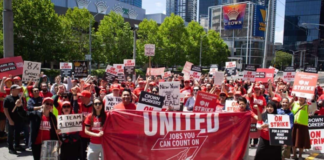Come the Revolution: A memoir
By Alex Mitchell, NewSouth Publishing $39.95
Alex Mitchell’s media career spanned the British Sunday Times, work under a young Rupert Murdoch at Sydney’s Daily Mirror and a job as Associate Editor on Sydney’s Sunday Sun-Herald. But for 15 years of his life he gave up a successful journalistic career to become a professional revolutionary socialist in 1970s Britain.
He grew up in North Queensland, where he learnt first hand about the power of working class struggle as a newspaper reporter in the mining town Mt Isa, during the 1964-65 strike.
Mitchell remains firm in his socialist convictions and his opposition to capitalism, which, he says, “looks weaker today than at any time in its centuries-old history.”
He became a Trotskyist along with thousands of others radicalised by the US war in Vietnam, the student protests and major events of 1968.
That year began with the Tet Offensive by the Vietnamese national liberation movement, which was the beginning of the end for the US in Vietnam. It showed the world’s mightiest superpower could be humbled by a popular resistance movement. In May a nation prepared for revolution in France after student riots detonated a ten million strong general strike—the largest ever in the West.
Meanwhile Russian troops stomped on the attempt to build democracy in Prague, within supposedly socialist Eastern Europe.
The ideas of Leon Trotsky, who had kept alive the genuine Marxist tradition in opposition to Stalin’s regime and the official Communist Parties in the West, gained a new audience among a generation of political activists demanding an end to dictatorship and imperialism, East and West.
And as Mitchell writes: “The rise of the Trotskyist movement in the UK in the 1970s was in direct proportion to the decline of the Communist Party of Great Britain.”
Mitchell joined one of the Trotskyist groups in Britain, the Workers Revolutionary party (WRP), led by Gerry Healy, and became editor of its newspaper.
They were heady days. Activists in Europe, the US and Australia witnessed the unforgettable impact of major industrial struggles, student occupations and massive demonstrations.
Many also drew inspiration from the struggles in the third world, like Vietnam, China under Mao and leaders of the Cuban revolution like Che Guevara. Mao, which had broken with Russia, appeared to offer an alternative based on heroic action by a minority of radicals. Che Guevara’s guerrilla strategy offered a similar appearance of radicalism.
Trotskyists rejected the model of Mao and Che Guevara, insisting that only a mass revolutionary movement of the majority of society, led by the working class, could bring socialism.
Third world regimes
But even some Trotskyists conceded to the support for third world national liberation movements and claimed these new radical regimes could build socialism from above.
The WRP was one of the worst examples. They even went as far as taking money from Libya, Iraq and the PLO. Mitchell admits this, explaining that: “I took part in official meetings with Libya’s Colonel Muammar Gaddafi, Iraq’s President Saddam Hussein, PLO chairman Yasser Arafat and Zimbabwe nationalist Joshua Nkomo at which secret solidarity agreement were signed.”
His group had accepted that these regimes could be supported critically because they were opposed to American imperialism (even while they imprisoned and tortured those in opposition to their brutal regimes).
Mitchell recognises that Libya and Iraq “were bourgeois nationalist regimes” who had “no recognisable affinity with Marxism or Trotskyism”. Yet the WRP became “Colonel Gaddafi’s revolutionary party in Britain”, promoting Gaddafi in the UK. The WRP even supported the Ayatollah Khomeini, uncritically, even when he high-jacked the Iranian revolution and butchered the left.
This put them in the difficult position of supporting the regimes in both Iraq and Iran—who went to war in 1980. Only then did the group break off relations with Iraq, which had invaded its neighour. They eventually broke with Libya in response to its criticism of the PLO and, “vast spending on military hardware at the expense of the Libyan people.”
Mitchell remains uncritical of this belief in “socialism from above”—from the WRP’s defence of the Eastern European Stalinist states to the WRP’s tendency to coat the leaders of nationalist revolutions in left colours.
The WRP at one point had a membership in the thousands and also attracted theatre and film professionals like Vanessa Redgrave and Ken Loach.
But its politics, its policy of sectarian isolation from the rest of the left and leader Gerry Healy’s autocratic style saw it implode in the mid-1980s.
Nevertheless, Mitchell’s memoir provides an exciting window into 1960s and 1970s Britain, when radical groups challenged capitalism as well as the existing political parties.
Judy McVey





